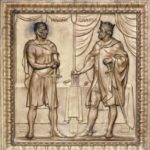Magna Carta was sealed on a field in England in 1215. Its purpose was to appease some frustrated barons, and it was never intended to last. Over 800 years later, this document is credited with establishing one of the most foundational principles of our democracy. So what does Magna Carta actually say? And how did it get from dubious stalling tactic in the 13th century to Supreme Court arguments in the modern era?
In this episode, you’ll learn how Magna Carta survived and thrived its way into our democracy.
This short episode includes a one-page Graphic Organizer for students to take notes on while listening, as well as discussion questions on the back side.
Comparing the Magna Carta and English Bill of Rights with the U.S. Bill of Rights
In this activity students will examine the influences of the Magna Carta and the English Bill of Rights on the Bill of Rights in the U.S. Constitution. By the end of the activity students should be able to cite clear examples of the influence of English legal traditions in the U.S. Bill of Rights; they should also be able to give examples of how the American document is unique in offering even further expanded rights.
Join the Barons!
King John has pushed your buttons and pulled your purse strings one too many times — will you join your baron brethren in the campaign for an agreement between monarch and landowners? And do you know the proper course of action? Make sure you’ve listened closely to our episode, the don your robes, dash out of your manor and find your surest footed steed — it’s time to make Magna Carta a reality. You can join the adventure here!
Magna Carta: Relevance for the 21st Century
Learn about the relevance of Magna Carta today and the importance of being an engaged citizen in this video from the ABOTA Foundation and PBS Learning Media. Includes video, background essay and teaching guide!
Magna Carta: Justification for American Independence
Explore how the principles of Magna Carta inspired American colonists to declare their independence from England in this video from the ABOTA Foundation and PBS Learning Media. Includes video, background essay and teaching guide!
Magna Carta: Introduction
Learn about the significance and influence of Magna Carta on U.S. history and government in this video from the ABOTA Foundation and PBS Learning Media. Includes video, background essay, guide for teachers, and teaching tips!
Magna Carta: Cornerstone of the U.S. Constitution

Magna Carta served to lay the foundation for later declarations of rights in England and the United States. In attempting to establish checks on the king’s powers, this document asserted the right of “due process” of law. It also provided the basis for an idea of a “higher law,” one that could not be altered either by executive mandate or legislative acts. This concept, embraced by the leaders of the American Revolution, is embedded in the supremacy clause of the United States Constitution.
Colonial Influences (Lesson Plan and Powerpoint)
American colonists had some strong ideas about what they wanted in a government. These ideas surface in colonial documents, and eventually became a part of the founding documents like the Declaration of Independence and Constitution. But where did they come from? This lesson looks at the Magna Carta, Mayflower Compact, English Bill of Rights, Cato’s Letters and Common Sense.
Commemorating Constitution Day
EDSITEment’s guide for teachers includes lesson plans for K-12 civics education that include analyzing art and primary sources, compelling questions, web-based interactives, and Spanish language resources.